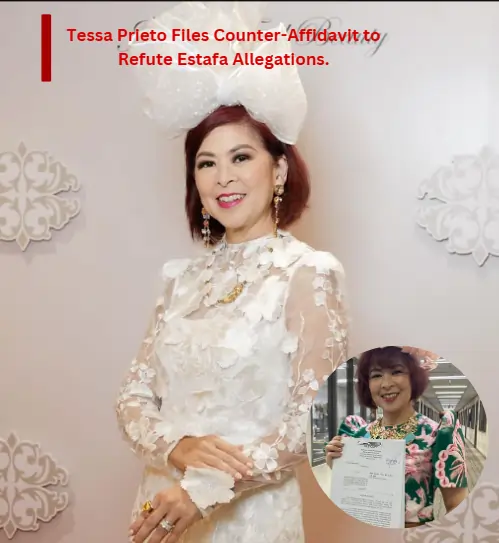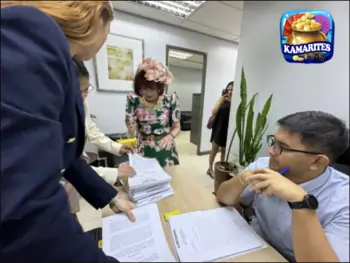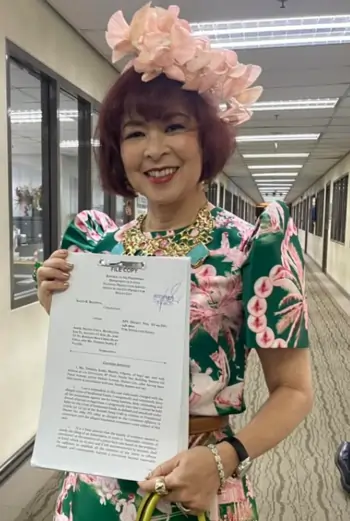
The Counter-Affidavit Saga: Tessa Prieto’s Fight Against Syndicated Estafa Allegations
In a compelling turn of events, renowned socialite and philanthropist Tessa Prieto steps into the legal spotlight as she formally files her counter-affidavit against syndicated estafa accusations brought by Salud Bautista. Behind the glitter of her high-profile lifestyle lies a story of resilience, legal complexity, and personal accountability.
This piece unpacks the details, humanizing both parties and providing a nuanced perspective on a case that’s captivating public attention.
Understanding the Allegations: What Is Syndicated Estafa?
Syndicated estafa is no ordinary charge—it’s a serious offense in the Philippines, punishable by life imprisonment if proven. At its core, it involves fraud committed by five or more individuals conspiring to deceive and exploit their victims financially.
In this case, Salud Bautista, a business leader, accuses Tessa Prieto of alleged involvement in fraudulent financial activities. While specifics remain under legal scrutiny, the accusations hint at significant financial disputes and potential damages.

Tessa Prieto: Beyond the Socialite Persona
Known for her vibrant personality and charitable works, Tessa Prieto’s name carries weight in elite circles. However, beneath her public image lies a woman now navigating legal challenges that could reshape her narrative.
Her counter-affidavit isn’t just a legal document—it’s a bold declaration of her side of the story. Tessa emphasizes her innocence, expressing her confidence in the judicial system to unveil the truth.
Salud Bautista: The Voice of the Accuser
On the other side of the case is Salud Bautista, a figure with her own story of loss and grievance. Representing the aggrieved party, she seeks justice for what she claims to be a deceitful financial scheme. Her allegations, if substantiated, could not only have legal consequences but also societal implications.
Bautista’s pursuit of this case reflects the larger fight against fraud in the Philippines, where accountability often clashes with influence.
The Legal Battlefield: Counter-Affidavit as a Strategic Move
Filing a counter-affidavit is a critical step in the Philippine legal process. It allows the accused to formally respond to allegations, presenting evidence and arguments that challenge the complainant’s claims. For Tessa Prieto, this move underscores her determination to clear her name.
Legal analysts highlight that the case’s outcome will hinge on the evidence presented by both parties. The burden of proof rests heavily on the accuser, but the defense must also present a compelling counter-narrative.

Implications for Public Figures in the Philippines
This case shines a spotlight on the vulnerability of public figures to legal disputes. While fame often shields individuals from scrutiny, it can also amplify controversies. For Tessa Prieto, the accusations threaten her carefully curated image as a philanthropist and fashion icon.
On the other hand, Salud Bautista’s pursuit of justice reveals the growing courage of individuals to challenge influential personalities, particularly in cases of financial misconduct.
Why This Case Matters
The Prieto-Bautista case is more than a legal battle; it’s a societal reflection on trust, influence, and justice. As Filipinos closely follow the developments, it raises questions about the ethical responsibilities of public figures and the mechanisms that protect individuals from exploitation.
Moreover, it underscores the importance of transparency, especially in financial dealings involving prominent personalities.
What’s Next?
The story is far from over. As legal proceedings unfold, the case could set a precedent for similar high-profile disputes in the future. Will Tessa Prieto successfully defend her name, or will Salud Bautista’s claims prevail in court?
What’s clear is that this case transcends the courtroom—it’s a narrative of humanity, accountability, and the pursuit of truth in a world where reputation and justice collide.
Disclaimer: This article is based on publicly available information and aims to provide a balanced perspective. It does not serve as legal advice or a definitive judgment. Readers are encouraged to follow the case as it unfolds and form their own understanding of the individuals and issues involved. (Kamarites)









